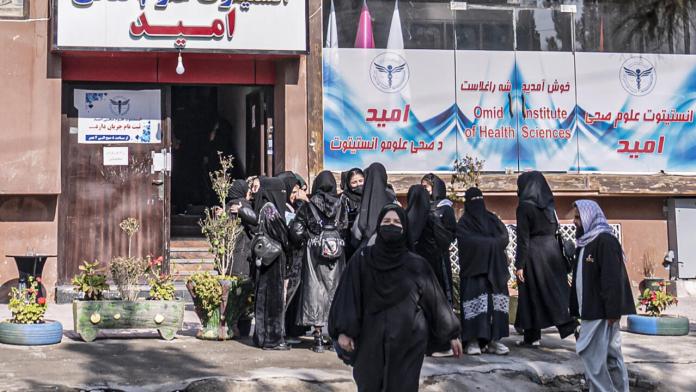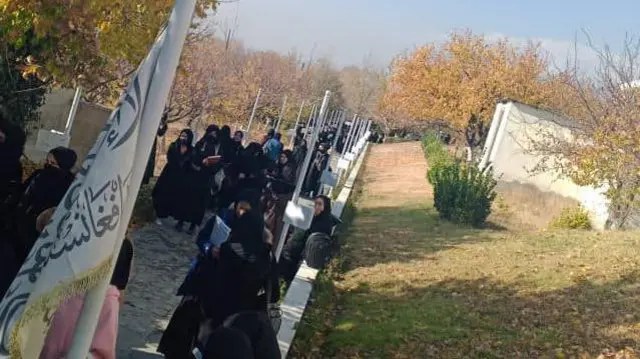
Afghan Women Barred from Midwifery Training in Latest Setback to Rights. In a move that highlights the ongoing erosion of women’s rights in Afghanistan, authorities have prohibited women from accessing midwifery training programs. This decision has sparked global outrage as it endangers maternal healthcare and further marginalizes Afghan women in a nation already grappling with severe gender-based restrictions.
A Dangerous Precedent for Healthcare
Midwifery is a cornerstone of maternal and child health, particularly in Afghanistan, where healthcare infrastructure is fragile and the maternal mortality rate is one of the highest in the world. Restricting women from midwifery training risks deepening an existing healthcare crisis by removing female healthcare professionals from a role that is culturally sensitive and critical.
The Taliban government, which reclaimed power in August 2021, has systematically rolled back women’s access to education and employment. Prohibiting midwifery education aligns with broader policies limiting women’s public participation and access to essential services.
Afghan women denied access

Healthcare experts warn that the consequences could be catastrophic. “Afghan women are less likely to seek care from male healthcare providers due to cultural norms,” said a humanitarian aid worker familiar with the situation. “Denying women the chance to train as midwives will exacerbate the already dire state of maternal health.”
A Pattern of Rights Violations
Since their return to power, the Taliban have implemented sweeping restrictions on women, including barring them from attending secondary schools and universities, and effectively removing them from the workforce in many sectors. This latest prohibition on midwifery education fits a disturbing pattern of eliminating women from public life.
International human rights organizations have condemned the move, calling it a direct violation of women’s rights to education, employment, and healthcare. “The denial of midwifery training is not just a blow to women’s rights; it’s an attack on the entire healthcare system of Afghanistan,” said a spokesperson for Amnesty International.
Impact on Women and Communities
The repercussions of this policy extend far beyond the immediate impact on aspiring midwives. It jeopardizes access to healthcare for millions of Afghan women and children who rely on female healthcare professionals for culturally acceptable medical care.
For many Afghan women, midwifery was one of the few professions where they could both contribute to society and provide for their families. Now, this pathway has been closed, leaving women with fewer options to achieve financial independence and serve their communities.
A former midwifery student, speaking anonymously for fear of reprisal, shared her disappointment: “Becoming a midwife was my dream, not just for myself, but for the women in my community. Now, that dream is gone.”
International Condemnation
The global community has expressed deep concern over this development, with many urging the Taliban to reverse their decision. The United Nations has called for immediate action to ensure Afghan women’s access to education and healthcare training.
In a statement, UN Women emphasized the importance of female healthcare workers in ensuring equitable access to healthcare: “Restricting women from midwifery training undermines Afghanistan’s healthcare system and violates fundamental human rights.”
Countries and humanitarian organizations have also raised concerns that these restrictions could lead to a withdrawal of critical international aid. Some donors have tied their financial support to improvements in gender equality and women’s rights.
A Call for Action
Activists and aid groups are working tirelessly to highlight the plight of Afghan women and seek solutions. Some are advocating for increased pressure on the Taliban through diplomatic channels, while others are exploring alternative ways to support Afghan women, such as online education and remote training programs.
Humanitarian organizations have also called on the international community to increase funding for healthcare services in Afghanistan to mitigate the impact of these policies.
A Bleak Outlook
For Afghan women, the ban on midwifery training is yet another reminder of the daily challenges they face under the Taliban regime. Despite international outcry, the government has shown little willingness to reconsider its stance on women’s rights.
As Afghanistan grapples with mounting social and economic crises, the exclusion of women from critical roles like midwifery not only threatens their rights but endangers the health and well-being of entire communities.
Source: eNCA
In other news – Good news for ‘Uthando Nes’thembu’ viewers
Good news for ‘Uthando Nes’thembu’ viewers! Fans of Uthando Nes’thembu are in for a treat as the hit show returns for its highly anticipated eighth season.

Set to premiere on January 22 at 8 PM, this season promises even more drama and deeper insights into the Mseleku family’s journey. With a revamped format and heightened stakes, season 8 is shaping up to be the most engaging installment yet. Read more
#Afghan #women #denied #access #midwifery #training #latest #blow #rights



